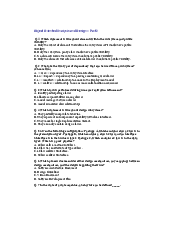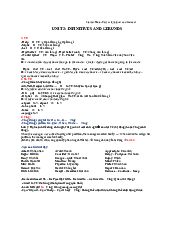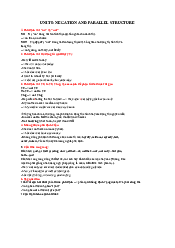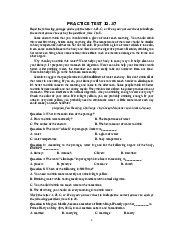



Preview text:
The importance of managers' skills to businesses
A manager who possesses good skills will help them make a difference and be able to assert themselves. In addition
will easily understand what they need to do, , managers
determine their goals, evaluate problems, and choose optimal solutions in unexpected
situations, which will help them operate more productively.
For the organization, owning a manager with good skills will help the company apparatus
operate more smoothly and tightly. Specifically, connecting members of the organization
together, how communicating information to subordinates for easy understanding,
managing human resources effectively, with the right people, in the right jobs.
Top 3 Important Skills a Manager must have 1. Technical Skills
Technical skills or hard skills are the total talents and expertise a manager needs to
possess to perform certain tasks or handle certain tasks. This skill is not a this is soft skill,
an ability that an individual acquires when experiencing learning, practice, experimentation. Example:
A factory manager will need to have expertise, understanding of machinery,
operation, management skills, coordination of work shifts,...
Management of technology products requires a person to have skills in computer
engineering, understanding, and updating trends in new technologies,...
In fact, the concept of "technical skills" is not simply understood as the ability to use
machines and technical tools, but this is a skill that requires both the creation of new
products, the ability to sell, sell services and products.
Managers in any job position will need deep understanding and expertise in that field.
This group of skills is very important, only when there is a specialized ability to handle
the job can managers achieve maximum performance. At the same time, only with
professional ability, managers can support, guide, or coordinate the work of subordinate employees.
Besides, professional skills also help managers build credibility and trust with their
employees. Few employees feel confident that the leader does not have the capacity and
understanding of the field and product of the business.
Technical skills is especially important for mid-level managers. In fact, senior managers
may be knowledgeable, capable of expertise, but may not require too much insight..
Senior managers often develop holistic, diverse, and broader strategies than middle managers.
For example, if the company operates in the field of technology, providing software,
middle managers such as technology managers, product managers, maintenance and
warranty managers are the ones with the best technical skills, not general managers. 2. Conceptual Skills
Conceptual Skills are the ability of managers to formulate ideas, creativity, multi-
dimensional insight into complex situations to create unique and different strategies and solutions for the business.
Thinking skills require managers to put themselves in hypothetical situations, motivate
them to look at complex organizational problems through the big picture, then find
optimal solutions and guide them to action.
This skills are especially important for senior managers. It requires them to understand
the direction and development strategy of the business, be able to analyze, evaluate and
predict possible risk situations in the future.
For example: The COVID epidemic hit and seriously affected the T-shirt manufacturing
industry of business A. Managers were aware of the challenges and opportunities at that
time when the company shifted to producing diverse cloth mask products, suitable for
each group of young, young, middle-aged customers ...
Thanks to cognitive and thinking skills, knowing how to adjust the direction to suit the
needs and times, managers can help the company overcome difficult periods. Or when
recognizing opportunities, managers also help the company to quickly grasp and develop outstandingly.
3. Human or Interpersonal Managerial Skills
Human or Interpersonal Managerial Skills, also known as human resource skills, people
skills, this is an essential skill and are almost mandatory for any manager. This skill includes:
Assign the right people at the right time (the right people)
Coordinate personnel in the right position, in accordance with the ability of that person (the right person)
Encourage, motivate, motivate employees to improve efficiency, improve work
performance by listening, empathizing, supporting, always accompanying and trusting them.
Human resource skills will help managers motivate subordinates to perform their work
more productively and effectively. At the same time, it helps optimize resources, avoid
the situation of "office zombie", working to cope, through speakers ...
For example: The current wave of layoffs of leading technology companies is showing
the fact that, in the context of economic risks and declining company revenue, managers
need to consider cutting personnel to maximize costs. To do so, they must have human
resource skills to evaluate and identify groups of low-performing, ineffective employees to fire or cut.
7 complementary skills for an excellent manager
1. Strategic planning and thinking skills
Managers who want to steer their business in the right direction, on the right roadmap and
towards a common goal, they need to have specific planning and strategic thinking skills for the future.
To conduct concrete planning, managers need to have strategic thinking and an
overarching vision. They need to identify important issues as follows:
What are the overall goals of the organization and the goals of each department?
What are the short-term and long-term goals to accomplish?
What do the resources of the current business include? Is it possible to implement the plan?
What undesirable situations can happen? Contingency plan for change in case of risk. 2. Communication skills
If a manager cannot communicate accurate, understandable information to employees,
and is not able to speak confidently with others, it is easy to have difficulty proposing or discussing a problem.
Therefore, to improve communication skills, managers need to practice short, coherent
expressions, know how to screen information and respond constructively. At the same
time, learn to listen, understand others, and control your emotions to suit the context. 3. Training skills
When managers have gathered enough capacity, experience and knowledge, they can
convey and share with subordinates. The current problem that many businesses face is
that the training program for new employees does not have a specific roadmap, the system is not really clear.
Therefore, managers need to build a methodical training system, and at the same time
directly guide subordinate employees, to optimize the cost of the training process for the
organization. Training skills are especially essential for intermediate and junior managers,
as well as an opportunity for them to monitor and evaluate the performance of their employees. 4. Problem-solving skills
The skill of solving problems and finding ways to respond promptly to all situations in
the organization is essential for a manager. This skill is demonstrated through actions such as:
Identify the problem and choose the optimal solution
Propose creative solutions to subordinates Assertiveness
Stay calm, communicate well when problems arise 5. Presentation skills
The nature of managers' jobs requires them to regularly stand in front of meetings with
employees, partners, and customers. Therefore, confident, fluent, articulate presentation
skills that articulate ideas are indispensable for an administrator.
To have good presentation skills, managers need to practice some of the following ways:
Use body language combined with clear, coherent speech
The voice is loud, clear, trying to pronounce it correctly
Look directly at the listener and move the gaze continuously to everyone
Use communication through images, videos, diagrams,...
Prepare your presentation thoroughly and practice speaking in front of a mirror. 6. Time management skills
Managers often have to perform multiple tasks at the same time, and sometimes the
workload will overload them. Therefore, time management skills will help managers
clearly identify important things, things that need to be completed in advance to meet
deadlines, avoid overload causing disturbances and pressure. 7. Market analysis skills
Managers with good market analysis skills can bring many development opportunities to
businesses. Especially today, with the fierce competition of the business environment, the
outstanding development of technology ... then identifying competitive advantages and
market trends is essential for a business to survive in the long term.
Methods to improve managers' skills
Technical skills, cognitive and thinking skills (Conceptual Skills) are 2 skills that depend
largely on the ability, suitability for the job and need different individual talents of each person.
However, managers can improve Human or Interpersonal Managerial Skills to improve
the performance of each employee by some of the following methods: Open, sociable communication
Really focus on listening to others, letting them share the whole story and limiting
interruptions. When discussing something, reiterate some of the core details the person
just shared, which will help the other person feel heard and respected.
Besides, learn to understand what others don't say. Instead, observe faces, gestures,
shades... from the opposite person to obtain information.
Delegation, avoiding micromanagement
A manager is not the one who takes care of all the work of the organization or works for
employees if the capacity and skills of that employee are not enough to perform the task.
Instead, learn to delegate to employees, avoiding micromanagement of the work of
subordinates. In terms of specific work, managers can authorize subordinates to perform groups of tasks such as:
The urgent work but does not require much thinking such as booking flight tickets,
booking meeting rooms, or booking to meet customers,...
Small things, done in quick time
Requiring little thought can be a repetitive task
Jobs are time-consuming but don't require much thinking, not important
Being able to quickly guide employees on implementation
Jobs that administrators do not have deep expertise such as graphic design, equipment repair,...
Continuous learning about management skills
A progressive attitude, updating knowledge and constantly learning so as not to fall
behind are essential requirements for an administrator . Accordingly, managers need to
update new knowledge and diverse skills to serve the current job. Practice thinking,
planning directions, and implementing effective work based on the actual situation




